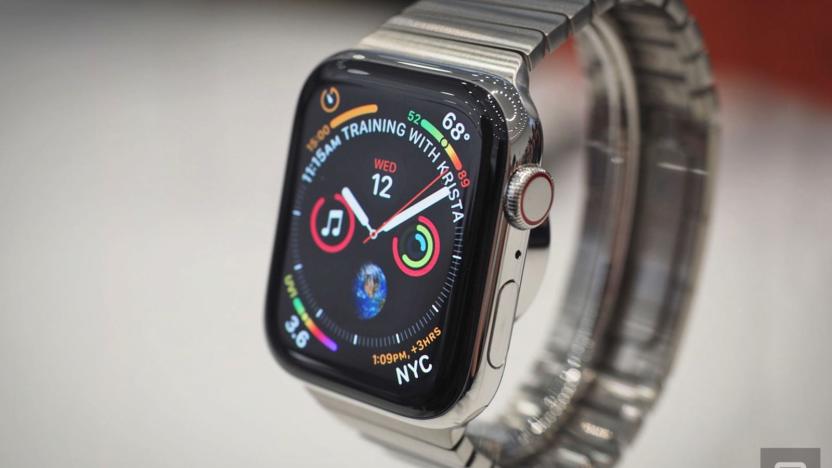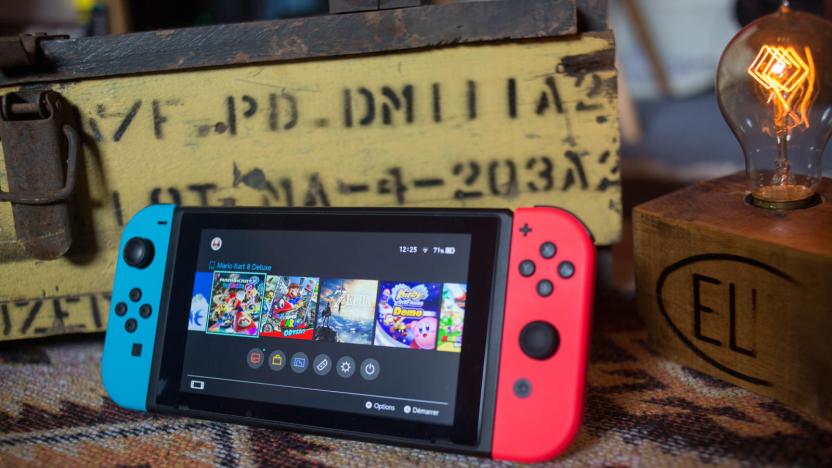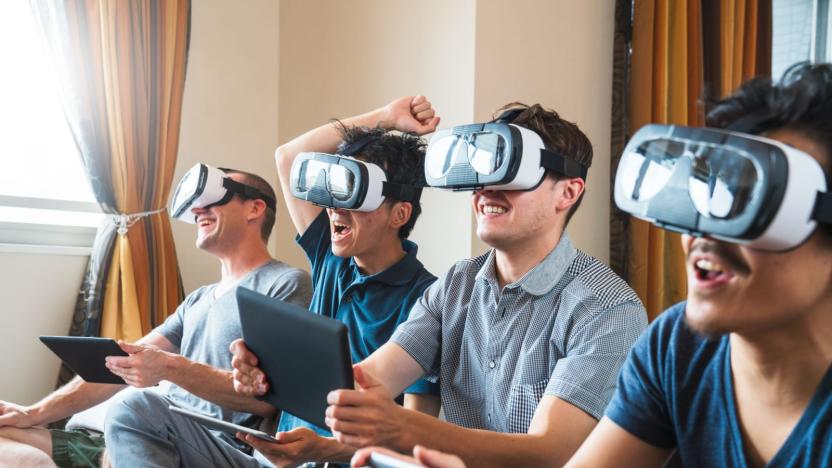npdgroup
Latest

'Anthem' was the top-selling game in the US this February
BioWare may be racing to fix Anthem after its bumpy launch, but it doesn't have to worry quite so much about its bottom line. NPD Group data shows that the shared-world shooter was the top-selling game in the US in February, and the second strongest game for 2019 up to that point (Kingdom Hearts III is the year's current champion). Moreover, this was the second best launch month for a BioWare game, falling only behind Mass Effect 3's debut in 2012.
Jon Fingas03.19.2019
One in six American adults now wear a computer on their wrist
The days of smartwatches as niche devices might be over, at least in the US. The NPD Group estimated that smartwatch sales jumped 61 percent in the 12-month span ending in November 2018. That's no mean feat when some companies scaled back their efforts or quit the field entirely. The analyst firm also determined that 16 percent of American adults, or about a sixth of the group, now own smartwatches. There's a good possibility that you'll see someone with a smartwatch if you walk down the street, to put it differently.
Jon Fingas02.12.2019
Nintendo Switch outsold every other console in the US last year
Demand for the Nintendo Switch didn't cool down one iota in 2018. The NPD Group has published its sales data for last year, and the Switch was the top-selling system in the US both in terms of dollars and raw unit count, outpacing a previous record set by the PS4 in 2015. Things were even rosier in December -- the Switch had the best unit sales of any console for that month since 2010, and the best dollar sales since the Wii mania of December 2009.
Jon Fingas01.22.2019
'Destiny 2' is 2017’s best-selling game after just one month
If you have friends who own video game consoles, chances are you heard a lot about Destiny 2 in the last month. But anecdotal evidence that the game was everywhere just got backed up by some astonishing sales figures. Just one month after launching on PS4 and Xbox One, Destiny 2 is already the best-selling game of 2017, according to an NPD Group report -- which was released a day before the game comes out on PC.
David Lumb10.23.2017
NPD estimates video game industry raked in $30.4 billion in 2016
The video game industry tracker NPD Group has occasional releases throughout the year, tallying up things from the month's top-selling games to console vs. console sales to how many NES Classic Editions flew off the shelves back in November. But it's the annual revenue generation that draws real attention as a loose report card for the industry, and last year's has just come out. In 2016, NPD estimates that consumers spent $30.4 billion on games and accessories, which is a modest $200 million more than in 2015.
David Lumb01.19.2017
'Overwatch' was June's best-selling game, even with a handicap
In case you haven't noticed, Overwatch is really, really popular. Popular enough to support millions of active players, host high-stakes professional competitive gaming drama and even inspire a graphic novel adaptation. All this, and the game's barely three months old. Still not convinced? Okay, we've got one more thing: Overwatch sold better than any other game in June -- and according to NPD Group, it won that top spot with a handicap.
Sean Buckley07.21.2016
NPD finally adds digital tracking to its game sales reports
For years, the NPD Group has tracked and reported video game sales figures. Every month, the company issues an email to the media detailing the top ten selling games for the month prior, total amount spent on games, hardware and accessories and year-over-year and generation-over-generation growth or decline. The glaring hole in those reports is that they didn't account for digital game sales from places like Steam, PlayStation Network or Xbox Live. But that's changing and with this month's data, we'll finally have steps toward a true, comprehensive picture of how much a particular title has sold, both from retailers and digital distribution.
Timothy J. Seppala07.13.2016
Netflix still the dominant streaming provider, according to latest NPD report
No, you can't hold the Bluths responsible for this -- not yet, anyway. The NPD Group's just released its latest figures for streaming video on demand (SVOD) in Q1 2013 and, unsurprisingly, Netflix still reigns supreme. According to the data, it's the many hours of available ad-free boob tube (read: TV) programming that's propelling SVOD viewership, so much so that it's increased by 34 percent year-over-year. Break that down amongst SVOD providers and you'll find 90 percent of that viewing pie belongs to (wait for it!)... Netflix, which actually represents a 4-percent drop from the same quarter last year. As for the general state of SVOD, the majority of eyeballs still turn to the television set for a streaming fix, with that device commanding an 80 percent share. And, yes, it's once again Netflix that garners the most use here (nearly 90 percent), but rival streaming services Hulu Plus and Amazon Prime are making gains at 10 and 2 percent, respectively. Although there does appear to be a minor chink in Reed Hastings' red armor. These latest numbers also show streaming subs branching out from a sole dependence on Netflix, with 10 percent adding Amazon Prime to the mix and 8 percent doubling down with Netflix and Hulu. Translation: they couldn't find what they wanted on Netflix. We've all been there.
Joseph Volpe06.04.2013
NPD Group: iTunes owns the internet video market
We'll find out how Apple's financial fortunes are faring a bit later this afternoon, but for now, there's a report out of The NPD Group showing that Apple now dominates home digital video the way it does the digital music market. The numbers are staggering: Apple's iTunes Store had a 67 percent share of electronic sell-through (EST) for television shows in 2012. How big is that? The nearest competitor was Xbox Video with a 14 percent share of EST. The stats were also in favor of Apple for feature-length movie downloads, with the company pulling in a 65 percent share of EST. Xbox Video and Amazon Instant video weren't even close in the competition, each having a 10 percent share. While Apple's lead wasn't as incredible in the internet video-on-demand sector, iTunes still led the way with 45 percent of the market. Despite Amazon Instant Video's popularity, it has less than half of the movie rental traffic of Apple at just 18 percent. Russ Crupnick, senior VP of industry analysis at NPD, believes that Apple's early moves in the market allowed the company to dominate the digital sales and rental markets for movies and that customer satisfaction is what's keeping the numbers high. Crupnick notes, "We've seen big-name entertainment retailers lose share, and even close, as their customer satisfaction metrics faded; however, that's clearly not the case with iTunes. Customers are quite happy with the store."
Steve Sande04.23.2013
IDC: Mac shipments down. Gartner: Mac shipments up.
It must be tough to be a market research firm these days. IDC released preliminary information of PC shipments for the first calendar quarter of 2013 today, showing the market to be dismal with an overall decline in PC shipments of almost 13 percent in the US year-over-year and Mac shipments apparently down 7.5 percent in the same period. On the other hand, Gartner's figures -- also released today -- show an 9.6 percent year-over-year decline in the US PC market, and shipments of Macs actually growing 7.4 percent in the same period. With Apple's fiscal second quarter earnings report coming up in less than two weeks, the conflicting numbers are sure to make financial analysts reach for the bottle of Jim Beam hidden in a desk drawer. As if the numbers from IDC and Gartner weren't perplexing enough, 9to5Mac points out that NPD Group's numbers show sales (not shipments) of Macs jumping a whopping 14 percent. Who's right? We'll all have to wait until the afternoon of April 23 to see the actual numbers from Apple. If history repeats itself once again, we're sure to see stellar numbers from Apple for most product lines, followed by a precipitous drop in AAPL's share price. You can join us for all the fun during our regular earnings call liveblog at 5 PM ET on April 23, 2013.
Steve Sande04.11.2013
NPD: Apple accounted for 1/5th of all US consumer tech revenue last year
The 2012 superlatives for Apple just keep rolling in. NPD Group released a report today showing an overall decline in US sales of consumer technology for the year, but that Apple's share of sales (based on revenue) rose from 17.3 percent in 2011 to 19.9 percent in 2012. Apple's sales share was over 10 percent higher than number two brand Samsung at 9.3 percent. HP, Sony and Dell -- taken together -- had less of a share (15.6 percent) of US consumer technology sales than Apple alone. NPD's data also show several ominous trends for all companies in the consumer technology sector. Revenues from sales of notebook computers were down 9 percent from 2011, while desktops showed a 11 percent drop year over year. Smartphone revenues grew at a slightly slower rate -- 25 percent -- in 2012 than in 2011 (28 percent), and growth in the tablet market slowed dramatically as well. 2011 was a banner year for growth of the tablet market, with a growth in revenue of 135 percent. Last year's numbers showed a drop to "only" a 42 percent growth rate. Whether that trend will affect Apple's earnings in 2013 is unknown, making growth in offshore markets like China and India all that much more important to the company. [via AppleInsider]
Steve Sande02.19.2013
Daily Update for January 4, 2013
It's the TUAW Daily Update, your source for Apple news in a convenient audio format. You'll get all the top Apple stories of the day in three to five minutes for a quick review of what's happening in the Apple world. You can listen to today's Apple stories by clicking the inline player (requires Flash) or the non-Flash link below. To subscribe to the podcast for daily listening through iTunes, click here. No Flash? Click here to listen. Subscribe via RSS
Steve Sande01.04.2013
NPD Group: US MacBook sales took a 6 percent hit during 2012 holidays
NPD Group is reporting that sales of Apple's MacBook line were 6 percent lower during the period between November 18 and December 22, 2012 than during the same period in 2011. The report, as described by John Virata of AppleInsider, notes that the average selling price of all MacBooks sold was up about US$100 from 2011 to $1,419 as well. Part of the explanation behind the drop in US MacBook sales could be that the only really new Mac notebook released in the run-up to the holiday shopping season was the 13-inch MacBook Pro with Retina display. In late 2011, Apple kickstarted sales of the entire MacBook Pro line by adding faster Intel processors, improved GPUs and hard drives with increased capacities. There's one bright side to the numbers, though -- at least sales of MacBooks didn't take the same hit as Windows PCs. NPD's figures showed an 11 percent drop in sales of notebooks running Windows, despite -- or perhaps because of -- the launch of Windows 8. Those touchscreen notebooks running Windows 8 that were hyped in advertisements had an average selling price of $700, but only accounted for 4.5 percent of Windows notebook sales.
Steve Sande01.04.2013
NPD: Android users chew an average 870MB of cellular data per month, youngest gobble the most
Ever wonder how much data you burn through every month on average? If you're an Android user within the US, odds are that it's quite a lot. The NPD Group estimates that Americans of the Google persuasion typically consume about 870MB of data on cellular networks every month. While it's not an extreme amount next to the 2.5GB of WiFi usage, it's enough to give anyone second thoughts about coasting on a basic data plan -- and a reflection of how both 4G and media apps have changed our behavior. Not surprisingly, it's a younger crowd more comfortable with smartphones that's the most aggressive: the 18-24 set races through 1.05GB a month where the 55-plus audience uses a more modest (if still healthy) 750MB. We don't yet know how iOS stacks up in current conditions, but the NPD is promising a comparable look soon. Something tells us the iPhone 5's LTE will lead to just as much voraciousness.
Jon Fingas09.28.2012
NPD: Apple, Samsung control 55 percent of the smartphone market, prepaid sales up 91 percent
According to NPD Group, Apple and Samsung control more than half of the American smartphone market. The second-quarter figures reveal that while contract phone sales are flatter than month-old soda, those for pre-paid handsets have shot up by 91 percent compared to the same quarter last year. The upswing is credited to last year's flagship handsets falling down the price ladder, snaring lower-income customers who were unable to afford to be early adopters. Cornering that element of the market has helped the battling duo increase their sales by 43 percent, leaving the rest of the technology pantheon scraping around for crumbs. Speaking of which, HTC is a distant third, having 15 percent of the market, while Motorola (12 percent) and LG (six percent) round out the top five.
Daniel Cooper08.08.2012
NPD: Nintendo 3DS sales hit 5 million in US, Xbox 360 still claims the console crown
The NPD Group's gaming figures for June have made the rounds, and both Microsoft as well as Nintendo have something to crow about, albeit for very different reasons. Nintendo is the most eager to prove itself and says that the 3DS has hit five million total sales in the US since it reached gamers' hands in the country. The tally doesn't compete with the heady numbers smartphone designers are used to, but it's a milestone for a handheld console whose prospects were dim until a sudden price cut fueled sales a year ago. Before Nintendo lets the 155,000 3DS units it sold in June get to its head, however, it's important to get context from Microsoft's own achievements: Redmond shipped 257,000 Xbox 360 units that month and has had the lead among all US consoles for the past year and a half. We're in the dark on Sony data, although it's important that just 90,000 Wii units traded hands in the same month -- as clear a sign as any that the Wii U can't come quickly enough for Satoru Iwata and company.
Jon Fingas07.12.2012
Ultrabook sales up in first half of 2012, Windows 8 waits patiently
We've seen so much Ultrabook news recently we're beginning to think they're catching on. Market research firm the NPD Group has stepped in to confirm our suspicions, reporting a 39 percent jump in sales of premium Windows laptops (900 bucks and up) during the first five months of this year, compared with the same period in 2011. Despite a three percent drop in sales of $700-plus Windows notebooks, the Ultrabook share of this bracket increased steadily to nearly 11 percent. The analysts predict sales of these lower-end models will pick up as back-to-school purchases sooth the post-summer blues, with a general boost to the whole Ultrabook market expected when Windows 8 arrives. One thing the figures don't tell us is what impact these sales are having on the revenue of Apple's skinny flagship, but we'd sure like to know. If numbers are your thing, the PR is past the break.
Jamie Rigg06.29.2012
Study: One in four iPad customers are new to Apple
Remember the early generation iPods - they were so popular and it seemed like everyone, even non-Mac users, had one? A recent NPD report about the iPad suggests the tablet device is slowly replacing the iPod as the device that gets people into the Apple ecosystem. In its Apple Ecosystem Study, the NPD group says 25 percent of buyers in the US snagged the iPad as their first Apple device. In its heyday, over 70 percent of Apple product owners purchased an iPod as their first Apple device. This number drops to 57 percent when you poll people who bought their first Apple device in the last two years. During this same two year period, the number of people picking an iPad or an iPhone as their first Apple device has climbed to 33 percent. Not surprisingly, this transition is reflected in Apple quarterly sales, which has shown a steady decline in iPod sales and increasing iPad and iPhone sales. [Via AppleInsider]
Kelly Hodgkins04.27.2012
Digital gaming soars nine percent, still knows nothing of rarity value
It's already chewed up some big names on the retail scene, but the game-downloading trend shows no sign of being sated. Fresh figures from market research firm NPD show that American digital game sales (including rentals and DLC) amounted to $2.04 billion in the fourth quarter of 2011, which represents a nine percent year-on-year hike at a time when physical game transactions fell three percent. Things are going the same way across the Atlantic, with the UK, France and Germany adding a further $1.29 billion to the burgeoning click-to-buy market. Industry types will surely welcome the news, since digital titles rake in higher margins (hello, PS Store) and reduce the trade in used discs, but what about those of us who'll one day want to swap our dusty copy of Fight Night Round Four for something more subtle?
Sharif Sakr03.23.2012
NPD: Hardware sales hit $144 billion in 2011, PCs lead the moneymaking pack
Canalys recently announced that smartphone shipments surpassed those of PCs for the whole of 2011. Well, NPD's just released its own set of hardware numbers, this time focused on revenue shares, and it appears PCs (that's laptops and desktops for NPD's purposes) are still far and away the biggest moneymakers around, bringing in about 19 percent (or $28 billion) of the reported $144 billion in hardware sales last year. TVs, PCs and gaming hardware each saw a decline in revenue share while smartphone and tablet sales grew -- slates and e-readers experienced a five percent increase, taking up nearly 11 percent of the hardware pie and raking in $15 billion. Unsurprisingly, Apple topped the chart for sales by manufacturer, seeing a 36 percent increase over 2010, while HP, Samsung, Sony and Dell rounded out the top five with varying levels of sales declines. For more number crunching and statistical whatnots, check out the full PR after the break.
Christopher Trout02.13.2012